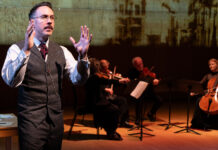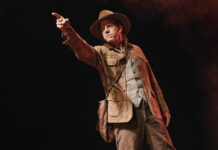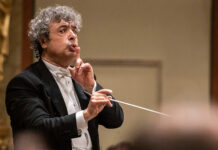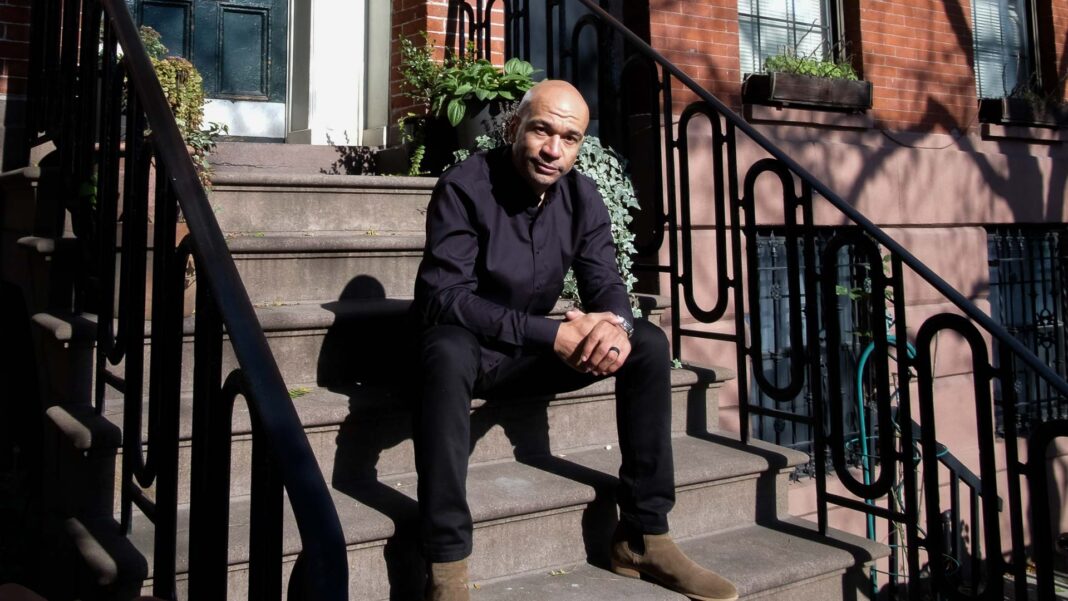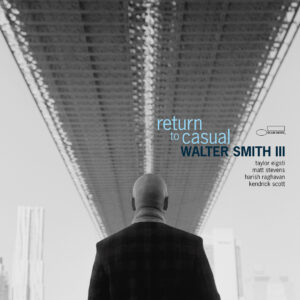
The world was casually introduced to jazz saxophonist and composer Walter Smith III with his 2005 album Casually Introducing Walter Smith III. Fourteen years later we learned he was Still Casual on his 2019 album. On Friday he makes his Blue Note Records debut with Return to Casual. Simply put, Smith is one casual dude.
He’s worked with some of the biggest names in jazz: Terence Blanchard, Herbie Hancock, Joe Lovano, Christian McBride, Jason Moran and more. What he’s been trying to do, as he told me recently when we spoke, is to “become a better composer. And slowly but surely, over time, I’ve kind of hit milestones that were important to me. I feel now I’m at kind of a foundational level of composition.”
Return to Casual features nine new songs composed by Smith. When he started writing the album, he wanted to make some fundamental changes in the way he wrote.
“One of the things that I noticed is as I started to improve as a composer,” he revealed, “I was leaving less space for the musicians to really interject. I was controlling every aspect of it. So in this one my goal was to keep the compositional aspect at the forefront, but to somehow build in space. A lot of my favorite composers, people that I work with, they leave space for personality. So that was what I was going for here.”
The album begins with a very playful song entitled Contra which reflects, in part, Smith’s own sense of humor, which he readily admits to and finds essential to who he is.
“To me, it is everything,” he admitted. “Because even when things are bad, you can still find there’s always humor in everything. Anything that happens to you, there’s always some kind of aspect of it that you can look at and have a chuckle. Even if it’s inappropriate to share with others. For your own well-being you can find it in there.”
In our conversation he shows how his sense of humor factors into how people might hear Return to Casual. The sixth song on the album, quiet song, is anything but. It smacks listeners in the face from the opening notes and surprised the musicians who joined him on the record.
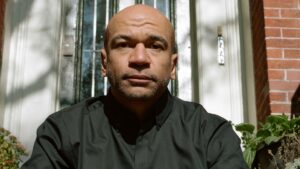
“I wanted it to just be that. Even in the rehearsal I had to convince people from the very first note, it needs to just be crazy,” he says with a laugh before revealing another part of his thinking. “Also entitling it I pictured an algorithm picking that up and ending up on a Spotify Jazz for Calm Cooking playlist or something. I would get a lot of delight over someone putting it on and then spilling sauce or something.”
Smith did find an opportunity to arrange a song by Kate Bush that he’s always loved and put it on the album. The song is Mother Stands for Comfort which can be found on her Hounds of Love album.
“It’s a song that I’ve had on my radar for years and I’ve been trying to figure out a way to make it work in the context of original music. That’s something that I’m always trying to figure out, to take standards or popular music and try to make it work where if I played it on a concert, it would not be an outlier. It would feel very much connected to all the other music.”
While writing Pup – Pow for the album he recognized some similarities between his new work and Bush’s song which might suggest his mind had finally figured out how to make it all work.
“When I was writing that song, I was like, it’s like the same chord progression, the same key. There we go. Now I’ve got a way to tie it in. Now I’ve got a way to use it.” And when he played the songs back-to-back at the Village Vanguard nobody seemed to notice. Which gave Smith tremendous satisfaction.
“That’s the whole point. Since that track was released as a single, I’ve gotten probably like a hundred DMs on Instagram from people that are like, ‘Man, I listened to this song every day for the last ten years. My mom had it on a tape and I forgot all about it. Then I found it on Apple Music and yours came up.’ All these people are in love with it. I don’t know if the Stranger Things situation helped put that on other people’s radar, but whatever it is, I think that’s kind of a cool way for people to find my music – which is a very unexpected situation.”
Equally unexpected was losing a good friend last year. Megan Stabile, a New York promoter who created unique opportunities for jazz and hip-hop to intersect and boosting awareness of jazz, took her own life. She was the head of Revive Music Group. Smith wrote the final song on the album, REVIVE, as a tribute to Stabile. It is, perhaps, the most emotional composition Smith has ever written.

“It’s bigger than just a personal thing. It is like a groundswell amongst a countless number of people. I look at her imprint on Blue Note, which launched Otis Brown and Marcus Strickland’s first records for the label. I look at the the first time I played Winter Jazzfest as a leader was through Megan on the Revive stage. I look at Igmar Thomas in the Revive big band. I look at the the Zinc Bar Session that was happening every week. Anytime you’d go down there, she would be there to greet you at the door. ‘Come in and have a drink. This is Walter, he doesn’t live here, but take care of him.’ Just creating community for people.”
Creating and having a community is a top priority for Smith. He is the Chair of the Woodwind Department at the Berklee College of Music in Boston. How and when he was most influenced by others inspires his desire to pass on the kind of experiences and information he gleaned from being mentored by Blanchard and being on the road with Hancock or the late Wayne Shorter.
“For a while there was a very lopsided aspect of in higher ed – and actually all levels – where everything was based on academic achievement and very little in the field. I guess the people that always inspired me were the people that were in the field. So getting to talk to Terence or Herbie as a student, that meant whether or not I learned how to spell a C major triad from them, it didn’t matter. What I did get from them is the reason that I’m doing this now, if that makes sense. There is the part where you’re dispensing knowledge to people, but there’s the part where you actually inspire them to do something with that knowledge and to actually stick with it. It’s not easy to do this. Especially in the beginning stages, you have to really love it and want to do it.”
He recalls one impactful moment from his time in high school (where he met Kendrick Scott who has played drums with Smith ever since and does so on Return to Casual. Smith returns the favor by playing sax on Scott’s recently released Corridors).
“I remember Roy Hargrove came to my high school. That one hour he was there kept me going for ten years after that. One of the things that I want to do is to continue to grow as an artist and have that work in the field and bring that directly to people that I get to work with. If I can give that same feeling to someone, that’s that’s the goal.”
As he continues to play and write music and inspire students, one thing he’ll always be is casual.
“I think it really does refer to kind of how I carry myself in general. I’m not really stressed out in any way. I’m pretty laid back, even when it comes to music. It was just something that we always talked about in high school. We would use it as a silly word. Being a touring musician, anything and everything does go wrong and you kind of learn by watching other people and seeing how different things affect the music, affect the tour, affect all of the aspects of it. To just relax and let it happen as it happens and roll with it is how I live in many ways.”
To check out Walter Smith III’s concert schedule, please go here.
All photos of Walter Smith III by George Clarke/Courtesy Blue Note Records



